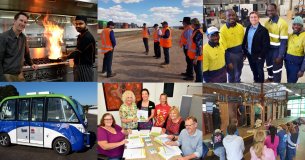-
Featured Items
-
Featured Resources
 Funding & Grants
Don't miss out on funding opportunities. Stay informed with our up to date online listings and email notifications.
Read More
Funding & Grants
Don't miss out on funding opportunities. Stay informed with our up to date online listings and email notifications.
Read More
 Skilled Migration
Our services help both applicants and employers, to learn more, develop plans, submit applications, and settle in.
Read More
Skilled Migration
Our services help both applicants and employers, to learn more, develop plans, submit applications, and settle in.
Read More
 Research and Analysis
Good research and analysis makes the case. How can our resources and services help your project or application?
Read More
Research and Analysis
Good research and analysis makes the case. How can our resources and services help your project or application?
Read More
 Information & Data Resources
With resources like REMPLAN, Regional Knowledge Base, and decades of data, discover how we can help your project.
Read More
Information & Data Resources
With resources like REMPLAN, Regional Knowledge Base, and decades of data, discover how we can help your project.
Read More
-
Stay InformedSubscribe to one or more of our regular email subscriptions, to be kept up to date on news and funding opportunities for the region
-
-
Our Region
- Our Region
- Regional Plan
- Regional Data
- Current Regional Issues
- Population Migration Analysis for 2016-21
- Job Vacancies Continue at All-Time High
- National Debt - What it Means for Our Economy?
- The True Value of Home Solar
- The Economic Impacts of Local Government Amalgamations
- State of the Regions Report 2014-15
- Antifragility - A different take on regional economic development
- Biohubs - Collaborative Waste Management
- Attracting New Residents
- Socio-Economic Impacts of the Murray Darling Basin Plan
- Murray Darling Basin Water Recovery
- Growing Businesses
- The Northern Inland Economy
- Geographical Overview
- Major Industry Sections
- Our Services
- Grants and Funding
-
Skilled Migration
- Skilled Migration
- Skilled Employer Sponsored Regional Visa
- Skilled Work Regional Visa (subclass 491)
- Temporary Seasonal Workers
- Designated Area Migration Agreement (DAMA)
- Helpful Information for Visa Holders
- Information for Employers
- Case Studies
- Payment Details
- Advice & Further Information
- Contact Details
- News & Events
-
Our Projects
- Our Projects
- Current Projects
- Skilled Migration
- Wool Works - Wool Training Schools
- Metal Works - Welding and Fabrication Schools
- Come On Inland
- Stories of Resilience
- Alt Brothers Beekeeping - Glen Innes
- Carelle's Toy Store - Glen Innes
- Greenhill Orchards - Arding
- Gwydir Meats - Warialda
- Kaputar Motors - Narrabri
- Moonbi General Store - Moonbi
- Sandstock - Tingha
- Sherelle Fashions - Tenterfield
- Sleepy Merino - Inverell
- Tenterfield Chamber of Toursim, Industry and Business - Tenterfeild
- The Welders Dog - Armidale
- Walcha Veterinary Supplies - Walcha
- AGCAP - Agribusiness Careers & Professions
- Northern Inland Regional Investment Profile
- Past Projects
- Digital Economy Strategy
- Business Growth Project
- Go Digital
- How to Start an Online Business
- Create Your Website Using Squarespace
- How to Edit Your Squarespace Site - Part 1
- How to Edit Your Squarespace Site Part 2
- Add a Shop to Your Squarespace Site
- Start a Blog and Find out What Customers are Searching
- 14 Tips For a Better Blog Post
- Which Social Media Platforms are Best for Your Business
- How to Use Facebook Effectively For Your Business – Part 1
- How to Use Facebook Effectively For Your Business – Part 2
- Instagram Tips for Business
- Catching Up, More Instagram & Dealing with Haters
- Getting Started with Twitter for Business
- Social Media Scheduling Tools
- How to Start an Etsy Shop – Part 1 – Research
- How to Start an Etsy Shop – Part 2 – Signup
- Online Security for Your Business
- Product Photography and Website Images: Your Guide
- 5 Tips to Improve your Productivity in your Business
- Best Online Business Resources
- How to Improve Your Communication Skills and Win More Clients
- NBN Coordinator
- Putting Power Back in the Regions
- Road Freight Study
- Town Audit Benchmarks
- Food and Wine
- Youth Survey
- Digital TV Switchover Assistance
- Northern Inland Transport Guide
- Live.Train.Work
- Northern Inland Innovation Awards
- Northern Inland Innovation Awards - 2017
- Northern Inland Innovation Awards - 2016
- Northern Inland Innovation Awards - 2015
- Northern Inland Innovation Awards - 2014
- Northern Inland Innovation Awards - 2013
- Northern Inland Innovation Awards - 2012
- Norther Inland Innovation Awards - 2011
- Prime Super Northern Inland Innovation Awards - 2010
- Prime Super Northern Inland Innovation Awards - 2009
- Northern Inland Innovation Awards - 2007
- Northern Lights Project
- NBN Smart Home
- Murray Darling Basin
- Moree Plains Business Workshops
- Namoi Investment Prospectus
- Industrial Land
- Bioenergy and Local Electricity Retailing
- Northern Inland Business Energy Assessment
- Skills for the Future
- Impacts of COVID-19 on Businesses
- Past Projects of NIRDB
- Aboriginal Employment and Enterprise in the Gunnedah Region
- Art as an Industry
- Aviation Survey
- Farm Forestry - Northern Inland Forestry Investment Group
- New England North West Film Strategy
- Northern Inland Excellence in Business Awards
- Food and Wine 2003 - 2008
- Prime Super Northern Inland Innovation Awards 2009
- Regional Business Networking Program
- Regional Leadership Course 2008
- Viticulture Strategy 2002-2003
- About Us
- Contact Us
- Other Resources
- Privacy and Legal
- Search
- Grants and FundingGrants and Funding
- Search for Grants and FundingSearch for Grants and…
- Economic Pathways to Refugee IntegrationEconomic Pathways to…
Back to Search Results ClosedGrant
Closed: 11th of April 2022 - 9:00 pm
Value: $50,000 to $1 Million per annum over three years
Run By: Australian Government Department of Home Affairs
Further Information: https://www.grants.gov.au/Go/Show?GoUuid=5ef2988d-ff9c-40da-a7b9-b494a489d2ed
Last Updated: 23rd of March 2022
ClosedGrant
Closed: 11th of April 2022 - 9:00 pm
Value: $50,000 to $1 Million per annum over three years
Run By: Australian Government Department of Home Affairs
Further Information: https://www.grants.gov.au/Go/Show?GoUuid=5ef2988d-ff9c-40da-a7b9-b494a489d2ed
Last Updated: 23rd of March 2022
Economic Pathways to Refugee Integration
 ClosedGrant
Closed: 11th of April 2022 - 9:00 pm
Value: $50,000 to $1 Million per annum over three years
Run By: Australian Government Department of Home Affairs
Further Information: https://www.grants.gov.au/Go/Show?GoUuid=5ef2988d-ff9c-40da-a7b9-b494a489d2ed
ClosedGrant
Closed: 11th of April 2022 - 9:00 pm
Value: $50,000 to $1 Million per annum over three years
Run By: Australian Government Department of Home Affairs
Further Information: https://www.grants.gov.au/Go/Show?GoUuid=5ef2988d-ff9c-40da-a7b9-b494a489d2ed
The EPRI program seeks to increase the rate of employment for refugees and humanitarian entrants with lower skill levels and low English language proficiency.
The EPRI program Grants to Social Enterprises grant opportunity will focus on the provision of support to economic participation focused social enterprises who can demonstrate the ability to achieve economic participation outcomes for refugees and humanitarian entrants.
The opportunity seeks proposals that will support refugees and humanitarian entrants with low skill level and/or English language proficiency into economic participation.
For the purpose of this grant opportunity:
- low skill is defined as those who have completed secondary education or lower. This is based on the Australian and New Zealand Standard Classification of Occupations (ANZSCO), which classifies the completion of secondary education as the lowest of the 5 skill levels for occupations and jobs undertaken for profit in the Australian and New Zealand labour markets. Further information on ANZSCO can be found at the Australian Bureau of Statistics website.
- low English language proficiency includes refugees whose English language proficiency is lower than vocational level. Vocational English is considered to be Level 3 proficiency under the Australian Core Skills Framework (ACSF) and/or a standard average of 5.5 in the International English Language Testing System (IELTS) or the equivalent standard in alternate language tests. Economic participation refers to employment and self-employment.
The EPRI program will focus on initiatives that are supported by evidence or have demonstrated success in achieving outcomes for this cohort of refugees and humanitarian entrants. For example, initiatives that address multiple barriers refugees face to economic participation, specific to their local labour market conditions, such as those that concurrently build English language ability and vocational skills in an area of workforce need; provide additional support to refugees looking to start their own businesses; or provide direct access to a role with a large employer, with wraparound support.
Search Grants & Funding
Quick Searches







 Latest News
Latest News
